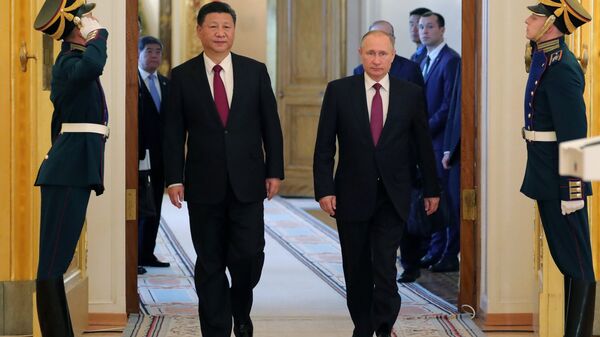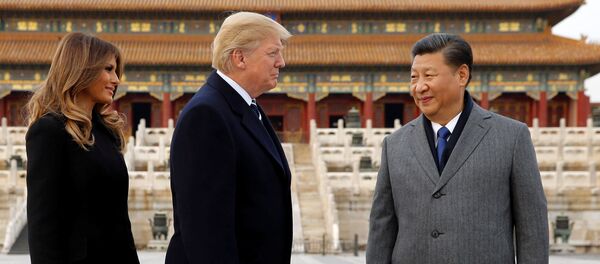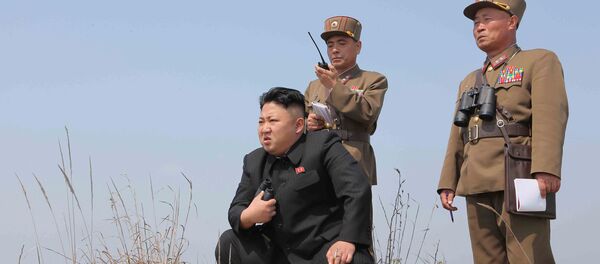It appears that US President Donald Trump came to Beijing to ask the Chinese leadership to help him untie the North Korean knot, CGTN commentator Andy Mok told Sputnik China, adding that it is still unclear whether new sanctions targeting Chinese banks that do business with North Korea would be enacted.
On Tuesday the US Senate Banking Committee unanimously approved new sanctions against North Korea targeting the world's financial institutions including those of the People's Republic of China that assist Pyongyang. Meanwhile, US President Donald Trump arrived in China on Wednesday, November 8, as part of his 12-day Asia tour.
What's Behind US Senate Banking Sanctions
"It's not clear if the entire Senate will ratify it and whether Trump will sign it," Mok said. "As for North Korea, Trump is asking Xi Jinping for help. Progress will depend a lot on what Trump is able to offer in exchange."
He noted that China and North Korea have always conducted financial transactions and "this is normal." Dr. Su stressed that "US sanctions are not reasonable, and [Beijing] will not act the way [Washington] expects."
At the same time, the academic admitted that China and the US share common interests on the Democratic People's Republic of Korea (DPRK) nuclear problem, adding that it poses a threat to regional peace and stability. The Chinese professor believes that despite the difference in approaches, the parties will have to make efforts to reach a certain consensus and progress in the bilateral negotiations.
CCTV Panview commentator Tom McGregor echoed Dr. Su: McGregor believes that China and the US "will take different approaches to handle the North Korea crisis, but they are working together, not against each other."
"Both nations realize that North Korea should not have nuclear weapons, which places the world in grave danger and so Beijing and Washington are working together to enforce stronger punitive measures against Pyongyang," he said.
According to the CCTV commentator, "the real story is that making deals with North Korea was a losing money venture, since [Pyongyang] was not always reliable in making timely payments when required."
Why Trump's Use of Force Doesn't Work
While the banking sanctions issue continues to provoke debate, it has become clear that Trump's tough strategy toward Pyongyang has proven highly inefficient, Dmitri Kosyrev, a Rossiya Segodnya political observer, noted.
"[Trump's] approach… was the following: First, a few months of hints of menace and strange maneuvers of warships (even now there are three aircraft carriers somewhere in the region). Then, the period of Trump's 'fighting' tweets," Kosyrev wrote for RIA Novosti.
Being nice to Rocket Man hasn't worked in 25 years, why would it work now? Clinton failed, Bush failed, and Obama failed. I won't fail.
— Donald J. Trump (@realDonaldTrump) October 1, 2017
However, during his recent visit to Seoul, Trump has called upon Russia and China to back him over North Korea.
"We are calling on all responsible nations, including Russia and China, to demand an end to the North Korea nuclear threat for peace," the US president told reporters.
The observer underscored that the failure of the Trump administration's strategy became obvious on November 4, when the Pentagon released its letter to American lawmakers stating that the only way to detect all of North Korea's nuclear weapons sites is to initiate an invasion of ground forces.
Citing Ted Lieu (D-Calif.), The Washington Post highlighted that a potential US-North Korea war could result in "300,000 dead in the first few days alone" with "more than 100,000 Americans potentially at risk."
For its part, Moscow and Beijing have repeatedly called upon the international community and Washington to lend their sympathetic ear to the Chinese "double freeze" proposal backed by Russia that could potentially decrease tensions on the Korean Peninsula and open the door to a resolution to the crisis. The plan, previously rejected by Washington, provides for the simultaneous cessation of North Korea's nuclear activity and US-South Korean military exercises.
"In the coming days Donald Trump will ask first China, and then, apparently, Russia to help him get out of the Korean conflict, in which he is bogged down solely because of he is in a habit to show everyone how severe and decisive he is," Kosyrev surmised.




